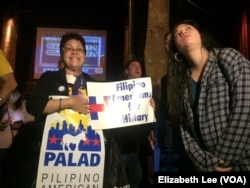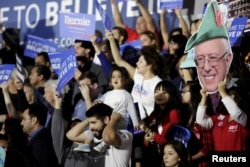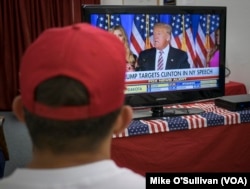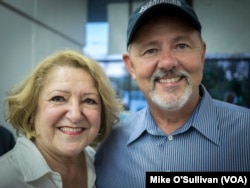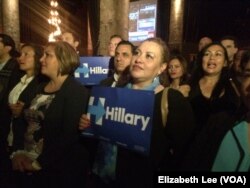Supporters of Hillary Clinton and Donald Trump, who affirmed their positions Tuesday as the presumptive nominees in the U.S. presidential election, must now get to work unifying their parties' divisions.
Clinton supporter Maxine Waters, a Democratic member of Congress, attended a campaign event in California, one of six states to hold presidential preference contests Tuesday. “Hillary Clinton started tonight to unify,” she said, noting Clinton's praise of Sanders' success in attracting young voters to his campaign.
Waters said it is time to start discussing joint areas of concerns in the party election platform, such as education, and that Clinton supporters need “to reach out to our many friends who are on the other side.”
Vietnamese-American Trung Ta, a Democratic Party activist and Clinton supporter, said the party rallied behind Barack Obama in 2008 after hard-fought primaries, and can do it again.
Grace Barrios, a Philippine-American supporter of Clinton, said Republican Trump will be the catalyst to unify Democrats.
That unity has not come yet. In Santa Monica, California, Sanders vowed take his fight to Washington, D.C., which will hold its primary June 14, and to the nominating convention in Philadelphia. “The struggle continues,” he said.
A polarizing candidate
Republicans face the challenge of unifying their party behind a nominee who remains polarizing, despite the fact that his opponents are out of the race. In Whittier, California, local Republican official Sylvia Southerland said rank-and-file members are gradually rallying, and that former Democrats and independent voters have been coming to the campaign office to change their registration to Republican.
This small city near Los Angeles has deep ties to the party. Former U.S. President Richard Nixon got his start in Whittier as a young lawyer, but today, the city has a majority Latino population, which tends to vote Democrat.
Mexican-American Oscar Llamas, a new Republican, is one of the exceptions. “I was always told that I was a Democrat and for that reason, I've always voted Democrat,” he said, but he drawn by Trump's promise to “make America great again” and the party's message of self-sufficiency.
“You learn to be dependent on yourself and not dependent on the government,” he said. Trump's pledge to build a wall along the southern US border does not offend him, nor do the candidate's criticisms of a Mexican American judge who is presiding over a lawsuit against a Trump business interest.
“He's definitely not a racist,” Llamas said, rejecting a criticism of Trump often heard from Latinos, and now from some Republican leaders.
Republican Olga Kirakossian is a reluctant Trump supporter, since “I will not vote for Hillary,” she said. Others see Clinton as a catalyst to motivate Republicans to vote.
Sami Autry, a 14-year-old student and part-time Hollywood actress, is an enthusiastic supporter who has been “knocking on doors” for the candidate, impressed with Trump's performance in the debates. Her mother, Barbara, says dislike of Hillary Clinton will motivate Republicans to vote.
Rita Topalian, a Republican candidate for the California assembly, is not endorsing Trump but wants voters in her district to decide for themselves in the presidential race. She says the election is polarizing, and “we wouldn't even have gotten here if the electorate wasn't fed up on both sides.”
Trump won all six Republican contests Tuesday, in California, New Jersey, New Mexico, Montana, and North and South Dakota. Clinton won four, with Sanders claiming victory in only in North Dakota and Montana.
Millennial voters
Morley Winograd, a one-time Democratic Party official and a political analyst at the University of Southern California, said so-called Millennial voters, who are in their late teens through their early 30s, could make the difference in his election. He says Bernie Sanders has motivated Millennials and that Clinton has captured the minority and women's votes. He says the challenge for Democrats is to reconcile these strands of the party.
He says the goal for Republicans is to expand their voter base beyond those who took part in the party primaries.
Senate Majority Leader Mitch McConnell, a senior statesman of the party, has urged Trump to stop insulting minorities. In New York Trump assured his listeners “I understand the responsibility of carrying the mantle” of Republican nominee, and he added that he would not let them down.





